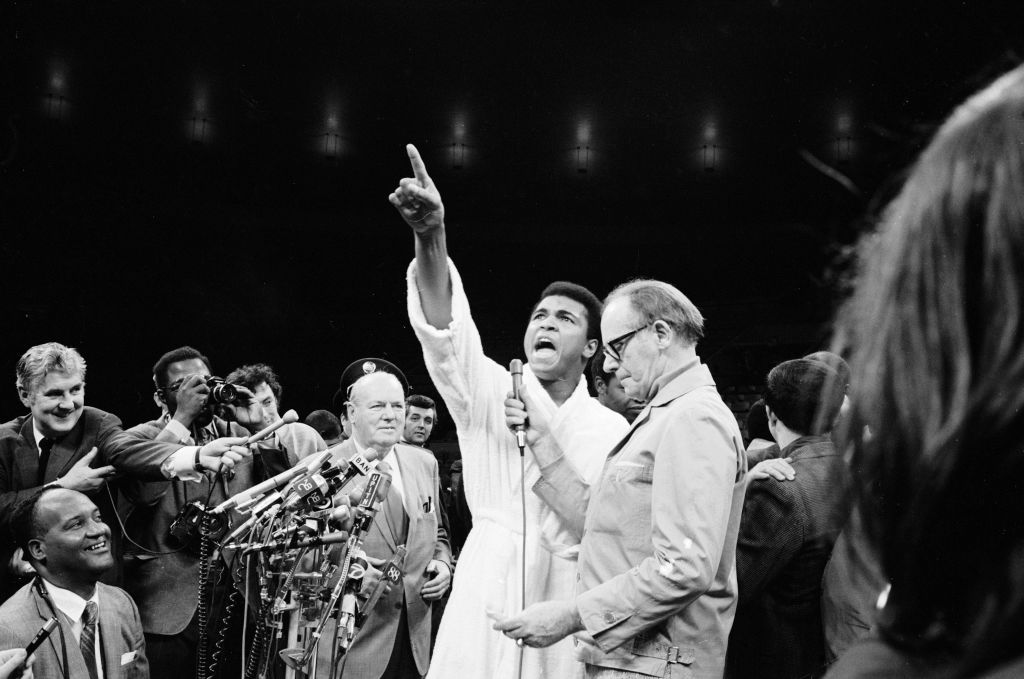Boxing
Muhammad Ali’s Legendary Trash Talk Did Way More Than Psyching Out His Opponents

Whether you love it or hate it, trash-talking is simply a part of sports. Perhaps no one understood that reality better than Muhammad Ali. While the boxer was an incredibly talented fighter, his wit was just as quick as his hands. His verbal assaults, however, did more than psych out his opposition.
It goes without saying that Muhammad Ali’s legendary status transcended the world of sports. His trash talk, for example, made an impact on global pop culture in a way you might not expect.
Muhammad Ali earned the title of ‘The Greatest’
RELATED: Boxing: The Roles of the 4 Basic Punches
When you’re referring to an athlete as ‘The Greatest’ or ‘The Greatest of All-Time,’ it’s easy to dip into hyperbole. Muhammad Ali, however, was definitely deserving of the title.
Growing up in Kentucky as Cassius Clay, Ali began boxing after someone stole his bike. Police officer Joe Martin channeled the boy’s aggression—he reportedly said he wanted to beat up the thief—into boxing. While Ali never learned under Martin, that suggestion still changed the course of sports history.
Ali eventually stepped into the ring and, with some guidance, turned into a skilled fighter. He cruised through the amateur ranks, winning everything from Golden Gloves titles to an Olympic gold medal, before turning pro in 1960.
In the professional ranks, Ali’s rise to the top continued. In 1964, he upset Sonny Liston to claim the heavyweight title; shortly after that victory, he adopted the name Muhammad Ali. The boxer, however, was about to enter one of the biggest fights of his life.
During the Vietnam War, Ali famously refused to be drafted into the United States Armed Forces; he was consequently stripped of his title and banned from boxing in every state. While that decision cost him almost four years of his career, Ali eventually returned to the ring. Once back in the saddle, he would reclaim the heavyweight title by defeating George Foreman in The Rumble in the Jungle.
Muhammad Ali’s famous trash-talk
While Muhammad Ali’s boxing ability obviously gets top billing, that wasn’t his only talent. The Greatest was also a master of the trash-talking arts.
According to a 1969 Associated Press interview cited by CBS Sports, Ali got his inspiration from pro wrestling. “[I got it] from seeing Gorgeous George wrestle in Las Vegas,” the boxer explained. “I saw his aides spraying deodorant in the opponents’ corner to contain the smell. I also saw 13,000 full seats. I talked with Gorgeous for five minutes after the match and started being a big-mouth and a bragger. He told me people would come to see me get beat. Others would come to see me win. I’d get ’em coming and going.”
Ali, however, would become a master practitioner in the art of trash talk. He said Sonny Liston was too ugly to be the heavyweight champ; on another occasion, he called himself the King of the World. Ali’s verbal assault on Joe Frazier—framing the bout as a match between the truth and an “Uncle Tom” —that Smokin’ Joe never forgave him.
That trash-talk created a lasting legacy outside the ring
RELATED: Who Would Win in a Fight: Bruce Lee or Muhammad Ali?
Muhammad Ali’s trash talk did more than make headlines and irk his opponents, though. The Greatest actually set the stage for modern rap and hip-hop with his boastful rhymes.
“Though he came to prominence over a decade before hip-hop music began germinating in the South Bronx, one of Ali’s most unsung and enduring legacies is as a spiritual father of rap,” Mike Rubin wrote in Rolling Stone. “Dubbed ‘The Louisville Lip,’ Ali brought the playful trash-talking of African-American traditions like ‘the Dozens’ out from playgrounds and street corners and into the mainstream.”
That opinion, however, isn’t only held by journalists. “Without Muhammad Ali, there would be no ‘Mama Said Knock You Out, and the term G.O.A.T. would have never been coined,” LL Cool J told the magazine. Rakim agreed, telling Rolling Stone that Ali “was the ultimate hero.”
In the leadup to his fight with George Foreman, Muhammad Ali famously told reporters, “I’ve wrestled with alligators, I’ve tussled with a whale. I done handcuffed lightning and throw thunder in jail. You know I’m bad, just last week I murdered a rock, injured a stone, hospitalized a brick. I’m so mean, I make medicine sick.”
With bars like that, it’s easy to see how The Greatest set the stage for today’s rappers.











